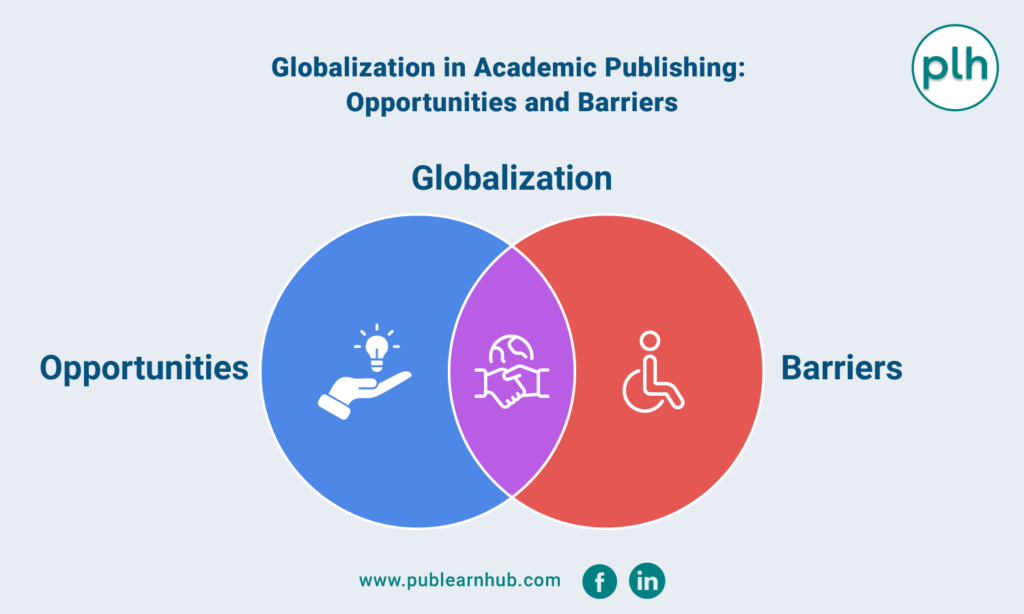Globalization in Academic Publishing: Opportunities and Barriers
Reading time - 2 to 3 minutes
Introduction
In today’s interconnected world, globalization is reshaping every industry, and academic publishing is no exception. With the rise of digital platforms, researchers and scholars from all corners of the globe are more connected than ever, creating new opportunities for collaboration, exchange of ideas, and a broader diversity of perspectives. However, globalization also brings challenges that publishers and researchers must navigate to ensure equitable and meaningful participation in the academic conversation.
The Rise of Global Collaboration in Academic Publishing
Global collaboration is one of the most significant outcomes of globalization in academic publishing. Researchers are increasingly working across borders, pooling expertise to tackle complex global issues. Collaborative projects are not only improving research outcomes but also promoting the sharing of resources and knowledge. Open-access platforms and international journals are facilitating this collaboration by making research freely available to a wider audience.
For example, initiatives like Elsevier’s collaboration with international universities have enhanced research dissemination, making it easier for researchers worldwide to access high-quality academic materials. Similarly, projects like ORCID are enabling researchers to track their work globally, regardless of geographic location.
Overcoming Language Barriers
One of the most significant challenges in global academic publishing is the language barrier. Historically, the dominance of English in academic journals has limited access for non-English speaking researchers. However, globalization is gradually changing this dynamic. Many journals are now publishing in multiple languages to reach a broader audience and promote inclusivity. Additionally, academic conferences and symposia are becoming more multilingual, ensuring that research from non-English speaking countries is heard and understood.
Platforms like Google Scholar and ResearchGate are playing an essential role by enabling researchers to access content in multiple languages and fostering an international research community.
Embracing Diverse Perspectives
Globalization in academic publishing has also led to an influx of diverse perspectives, enriching the global knowledge pool. Researchers from different cultural backgrounds bring unique approaches, methodologies, and viewpoints, which help to challenge existing paradigms and drive innovation.
Journals like The Lancet have championed diverse perspectives by publishing research that addresses global health issues from different cultural contexts. Similarly, the publication of international research in areas such as climate change, social sciences, and technology has broadened the scope of academic discourse and led to a more comprehensive understanding of complex issues.
The Barriers: Inequality in Access and Publication Opportunities
Despite the many opportunities, globalization in academic publishing also brings several barriers. One of the most pressing issues is the inequitable access to resources. Researchers in low-income countries often face challenges such as lack of access to subscription-based journals or academic databases. Open-access initiatives have addressed this issue to some extent, but there is still a significant gap in access to high-quality research materials.
Additionally, language barriers and the dominance of English in high-impact journals continue to disadvantage non-English speaking researchers. Although multilingual platforms are growing, the academic world still has a long way to go in ensuring that all voices are represented and heard.
Conclusion
Globalization has undeniably opened doors to greater collaboration, diversity, and access in academic publishing. However, for the full potential of globalization to be realized, stakeholders must address barriers like inequality in access and language limitations. By fostering inclusive practices, promoting open-access platforms, and embracing diverse perspectives, the academic publishing world can continue to evolve, ensuring that all researchers have an equal opportunity to contribute to the global knowledge pool.
